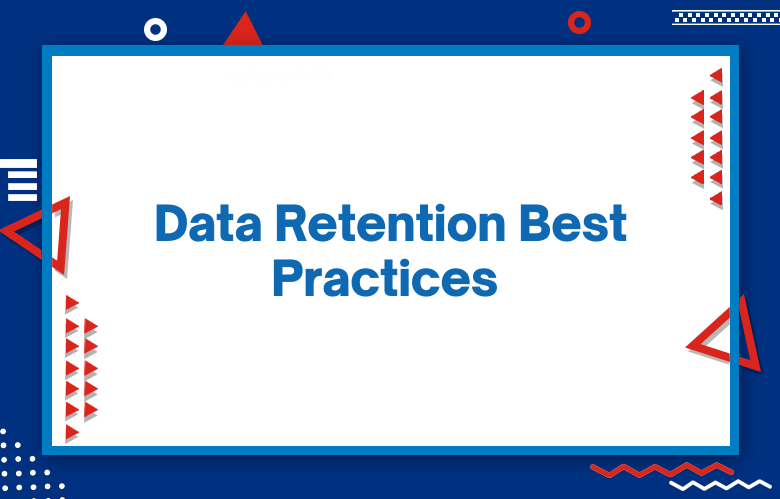Data Retention Best Practices for Digital Marketing

Data Retention is an integral part of any digital marketing strategy. To understand how to go about data retention, we need to know why it’s essential for your business. Data can show you which segments have a high ROI and low conversion rates, what they’re most interested in buying from you, the best time of day or month to drive the most increased conversions, and more.
With this information in hand, you’ll be able to tailor your content around these metrics and make advanced decisions regarding advertising spending on Facebook or Google Ads, as well as where your budget should go towards investing in new customer acquisition campaigns like SEO or SEM.
Data retention is an integral part of digital marketing. The average person only remembers about 20% of what they read in a blog post or article, so it’s crucial to ensure you provide them with as much helpful information as possible.
The only way to do this is by using infographics and other visuals to help people remember more information by making it easier to process the material.
Another great idea would be to provide links throughout your posts that readers can click on to learn more about specific topics. This makes it easy for readers interested in learning more about those particular subjects without having to leave your site and find another resource elsewhere online.
How much data should you keep? How long until it’s time to delete old emails, tweets, or images? This article will give you the best practices for digital marketing and how long it takes to keep your data.
Several factors play a role in deciding what is right for your business. It’s important to know what each of these considerations means for your company and then decide to hold onto this information.
Data retention is a topic that continues to be debated in the digital marketing industry. Some believe in keeping all customer data indefinitely, while others think companies should delete old and irrelevant information.
As with many issues, both sides have pros and cons, but one thing is clear: Data Retention Best Practices For Digital Marketing can help you decide how long you should keep your consumer data.
What is Data Retention?
Data retention is keeping a copy of your data so you can access it when needed.
Data Retention is keeping data on your computer or other devices.
Data retention is the legal requirement for a communication service provider to store communications data for a certain period.
Data retention is a legal obligation requiring telecommunications providers to retain customer information for up to two years.
Data Retention is the process of saving data. If you’re wondering how long your data will be kept, you can contact our Data Policy Team to find out what we do with it after a certain period.
Why do we need to retain data?
Keeping data around is important because it allows us to analyze it in the future. If we delete data right away, there’s a chance we’ll never know how valuable it is for our business.
Data retention is a controversial issue that has been going on for years. While some people think retaining the information is essential, others believe it infringes on their privacy rights and slows investigations because they must go through so many old files.
Retaining data is necessary to hold on to and use for future purposes.
The purpose of retaining data is to be able to refer back to it and use it.
How does data retention affect digital marketing?
Data retention is the process of keeping data from users on your website. This can be useful for analytics, but it also has a significant drawback: if you keep information about how people use your site, they may not trust you as much.
Retaining customers is vital for any business to thrive. Data retention allows businesses to learn more about their clientele, which helps them create and market products that specifically serve the needs of those groups of people.
Data retention is the practice of storing the data collected by digital marketers. Since it’s reserved for an indefinite period, it can be analyzed to see if any patterns could help improve marketing efforts.
Data retention is a term that refers to how long data providers keep customer information on file. Retained data should be managed carefully because it’s valuable and can help brands increase loyalty, improve marketing accuracy, and provide insights into consumer behavior.
Digital marketing is affected by data retention through the laws placed on companies that store people’s personal information.
Data Retention Best Practices For Digital Marketing
- Determine what data is necessary for your company to function
- Define the retention period for each type of data you need to store
- Make sure that all employees are aware of the retention policy and have access to it
- Get a data retention policy in place
- Keep records of all data you store and keep it secure from unauthorized access.
- Regularly delete old customer information, including social media posts or blogs irrelevant to your business.
- Establish guidelines for employees handling customer information- they should never share personal details with anyone outside the company. They should always take care when handling sensitive information like credit card numbers.
- Have a data retention policy that covers all digital marketing channels
- Know the difference between personal and business data and keep them separate
- Make sure all employees know how to handle confidential information
- Create an inventory system for stored data to see what you have on hand
- Store data securely- this includes choosing secure cloud storage providers or keeping it in a locked room with limited access
- Keep a backup of your digital data
- Store your backups in different physical locations to minimize the risk of data loss.
- Encrypt all sensitive information.
- Delete old, irrelevant, or outdated files from your computer and storage devices.
- Understand the importance of data retention for marketing
- Optimize your website so that it is more search engine friendly and has better SEO
- Create a customer relationship management system, or CRM, to keep track of customer information
- Use email marketing to generate leads and increase sales
- Understand what data is stored
- Avoid storing any personally identifiable information.
- Store your data in a secure location that you can access at anytime
- Make sure to back up your data frequently and have an offsite backup plan as well
- Identify your data retention policy
- Create a Data Retention Policy for all employees and contractors
- Collect information about what type of data is collected, why it’s being collected, who has access to the data, and how long you’ll need to keep the data
- Assign an individual or group of individuals as responsible for managing your organization’s data retention activities and policies
- Be clear about which information you need to retain
- Determine how long the data should be kept for
- Create a retention schedule that includes when and how often to delete old records.
- Consider what happens if your company goes out of business or is acquired by another company.
- Implement an audit process
- Delete old social media posts
- Purge your email inbox of any unnecessary emails or newsletters
- Archive old blog posts that aren’t being updated anymore
- Remove unwanted PDFs, presentations, and other documents from your computer
- Data retention is the length of time that data is stored
- Retention periods are usually determined by law or business needs
- One of the significant things in digital marketers is how to handle personal information and consumer preferences, which can vary depending on the region
- To help you comply with any applicable laws, we recommend storing data for as long as possible without compromising your company’s ability to serve customers
- For example, if a customer asks you not to keep their email address after they make a purchase, then it may be best not to retain this information at all
- Understand what data retention is
- Set up a system for backing up your digital marketing data
- Determine how long to keep different types of data and set an expiration date on the backups
- Store your backup media offsite in case of emergencies
- Review your data retention policies
- Would you please keep a record of what you delete and when you deleted it
- Don’t delete any emails or files that are relevant to the investigation, even if they’re not related to the incident in question
- Be mindful about using external hard drives and other storage devices; many contain sensitive information that can be accessed by all who have physical access to them
- Understand the data retention policies of your marketing channels
- Define what data is needed for each campaign and create a plan to collect it
- Ensure you have permission to use any customer information that you are collecting
- Retain all records related to your campaigns, including those with no results
- Review your analytics regularly and make adjustments as necessary
- Collect data from your customers
- Store data in a secure environment and encrypt it to protect against unauthorized access
- Keep the retention period short, but not less than one year for GDPR compliance.
- Delete any personal information that is no longer needed
- Regularly review what you’re retaining, why you are keeping it, and who has access to it
- Store data in a secure location
- Make sure to back up your data regularly, preferably daily
- Keep track of how much storage space you have left on your server and re-evaluate as needed
- Be mindful of what type of information is being stored and for how long it’s necessary to keep it
- Data retention is the process of storing data for a set period
- Retention periods can vary depending on the type and sensitivity of data being stored
- The length of time you need to keep your data will depend on what regulations are in place for your industry or region, as well as any contractual obligations with third parties who have access to your data (e.g., customers)
- Digital marketing agencies should store their client’s personal information for up to five years after they stop working together
- Determine what you need to keep
- Establish a retention policy and keep it up-to-date
- Create a data retention strategy that matches your needs
- Maintain an inventory of all collected data, including date ranges and types of information stored
- Implement security measures for access to the data as well as physical protection from unauthorized deletion or modification
- Data Retention is the length of time that data is stored on a server or device
- The length of time varies depending on the type and size of data, as well as its sensitivity
- It’s essential to know how long you should keep your digital marketing content so you can save money by not storing it for too long or deleting it too soon
- Store all data in a secure and safe location
- Store the data for as long as your company is required to
- Make sure that you are storing the correct type of data, such as email addresses or phone numbers
- Keep track of what kinds of information you hold so that if there is ever any question about it, you’ll know how to answer
- Delete old data from your database
- Edit and delete any unnecessary or outdated information from your website’s content.
- Update all of the links on your website to point to current pages
- Check that the contact information for you, your company, and anyone else mentioned in media coverage is up-to-date
- Understand the difference between data retention and deletion
- Determine which type of data to retain for your business
- Implement a policy that is compliant with legal requirements, such as GDPR or COPPA, if applicable
- Keep records of when you delete information from your database so it can be recreated in the disaster recovery scenario
- Perform regular backups and verify they are correctly stored offsite
- Keep track of all the data you are collecting
- Create a plan for your data retention strategy and stick to it
- Make sure you have a copy of all your customer information should anything happen to one of your servers or databases
- Be careful with how much personal information you collect from customers, such as phone numbers, addresses, and email addresses
- Keep all data for a specific period
- Store data on an encrypted drive or in the cloud
- Archive old emails and files to ensure they’re not accessible by employees who are no longer with the company.
Conclusion
It’s essential to have a plan for the data you collect. You should know what will happen with your customer’s information after it is collected and how long it will be stored.
We hope this helps clarify these issues and encourages marketers to take steps to protect their customers’ privacy. If you want more help developing your company’s robust data retention strategy, please get in touch with our team at Meer Digital Marketing Solutions!
Call: +91 9848321284
Email: [email protected]



